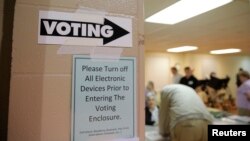The Cambodian community in the United States is fairly small when compared with other Asian expatriate groups, but they come together to address issues when pressed.
Ahead of the November 8 presidential election, Cambodians in the U.S. are working to pool votes in large numbers for candidates whom they see as strong on education, jobs and health care.
“We are conducting a campaign to encourage people to join us to elect representatives in their states,” said Prom Saonora, honorary president of the Cambodian-American Alliance. “Whichever candidate is willing to help us, we will support them.”
An estimated 300,000 Cambodians live in the United States, according to an April 2015 report by the Center for American Progress (CAP).
In the 2012 presidential election, 62 percent of registered Khmers voted, with three-quarters of those voters choosing incumbent President Barack Obama.
Voter effort
Nem Chhoeung, founder and president of Cambodia Town in Atlanta, Georgia, said that his community, with about 10,000 members, typically has an impact on local elections.
“Almost 70 percent of the Cambodian-Americans live in the same town in my community,” Chhoeung said. “Therefore, representatives in this district, and even our senator, depend on our support. We are able to vote them in or out.”
Chhoeung urged Cambodian communities throughout the U.S. continue to unite in their efforts to demand leaders address challenges they face and also help their countrymen back home.
“We have to unite to show our strength that we don’t only have temples and associations, but other businesses behind us, too,” Chhoeung said. “These businesses have benefited us a lot such as employing workers. This is our undeniable contribution to the U.S.”
Most Cambodian-Americans settled in the U.S. as refugees of the fallen Khmer Rouge regime in 1979. While the U.S. government relocated about 150,000 among several states, the top states for residence include California, Massachusetts, Washington, Pennsylvania and Texas.
Before arriving in the U.S., most Cambodians had little knowledge of the West or the English language, which subsequently affected income and education.
Compared with other major U.S.-based Asian communities, such as Chinese, Korean, Indian and Vietnamese, Cambodians have the highest poverty rate, at 18.8 percent, compared with 13.9 percent for Vietnamese and Koreans.
Reserved nature
Analyst Kuch Schenley said the traditionally reserved nature of the Khmer community in the U.S. means their concerns often went unheard in political circles.
“U.S. politicians really want to help Khmers, but if they don’t know what we want and what we are suffering from, how could they help?” Schanley asked. “That’s why I believe there should be activities organized in some U.S. towns to express our concerns. Cambodian-Americans should change our habit from staying quiet to expressing our dissatisfaction if there is any, or requesting anything so that politicians know and work for us.”
Many Cambodian-Americans own businesses, such as restaurants, tour companies and grocery shops.
Others are directly involved in the political process.
In 2012, Sam Meas became the first Cambodian-American to run for a Congressional seat in Massachusetts. Despite the Republican’s unsuccessful bid, he remains active in his community.
This year Meas is urging voters to focus on security, immigration and jobs, because these issues most affect the Cambodian community.
“I believe that, nowadays, U.S. citizens in general — and especially Cambodians in Massachusetts — face unemployment and difficulties to find a job,” Meas said. “They [have difficulties] to find a job because the tax is increasingly high, and, secondly, companies have shifted factory jobs… to [places] like Sri Lanka, Mexico and other countries.”
United community
He also urged people to vote for their preferred candidates, saying that, in addition to those basic challenges, issues such as deportation of non-U.S. citizens require the support of an outspoken, united ethnic community.
“In a democratic society, those who make louder noise will receive support,” Meas said. “Therefore, I appeal and beg [the] Cambodian community in the U.S., especially those [faced with] deportation, to register to vote, apply for citizenship, so that we can petition our representatives.”
Rep. Rady Mom of Massachusetts, the first Cambodian elected to a state legislature, described himself as living proof of an active, civically engaged minority community.
“The reason why I’m here is because all people have united and put me to work for them,” Mom said. “Without their votes, I would not be here. I’m now working for them. This is my job. When there is a request, I accept it and look at it from every angle, trying to find the best answer for them, or using any law to address the issue in our community.”
This report was produced in collaboration with VOA's Khmer Service.











